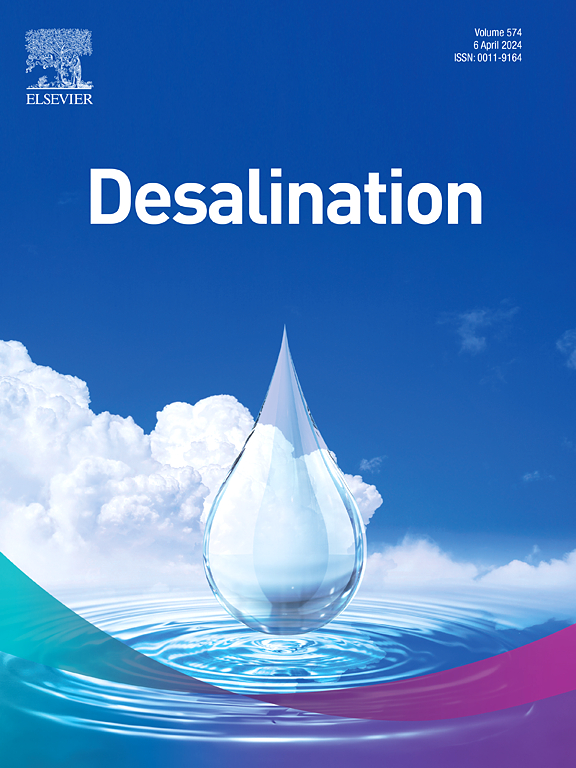原位热活化过氧单硫酸盐预处理在海水膜蒸馏中有效的生物污染缓解策略
IF 8.3
1区 工程技术
Q1 ENGINEERING, CHEMICAL
引用次数: 0
摘要
本研究介绍了一种新型的原位热活化过氧单硫酸根(PMS)系统作为一种有效的预处理策略,以减轻海水淡化膜蒸馏(MD)中的生物污染。在MD操作温度为60、70和80°C时,该系统在红海海水中表现出强大的微生物灭活能力。这是由于热加速了活性氯的生成,实现了超过3.6的对数去除。与未处理的系统相比,热激活PMS系统在体积浓度系数为4的情况下显著降低了标准化蒸汽通量下降,在60°C时降低了约3.2倍(54%比17%),在70°C时降低了3.8倍(42%比11%),在80°C时降低了5.7倍(56%比9.9%)。光学相干断层扫描成像证实了这些改进,证实了MD膜表面生物膜的形成受到抑制,活细胞分析证实了活细菌细胞沉积的大幅减少。这些发现突出了热活化PMS系统作为一种可持续和高效的原位预处理策略的潜力,能够解决生物污垢挑战并提高MD性能,为海水淡化应用提供了实用且可扩展的解决方案。本文章由计算机程序翻译,如有差异,请以英文原文为准。

In-situ heat-activated peroxymonosulfate pretreatment for effective biofouling mitigation strategies in seawater membrane distillation
This study introduces an innovative in-situ heat-activated peroxymonosulfate (PMS) system as an efficient pretreatment strategy for mitigating biofouling in membrane distillation (MD) for seawater desalination. The system demonstrated robust microorganism inactivation in Red Sea seawater at MD operating temperatures of 60, 70, and 80 °C. This was attributed to the thermally accelerated generation of reactive chlorine species, achieving a log removal exceeding 3.6. The heat-activated PMS system significantly reduced the normalized vapor flux decline, by approximately 3.2 times at 60 °C (54 % vs. 17 %), 3.8 times at 70 °C (42 % vs. 11 %), and 5.7 times at 80 °C (56 % vs. 9.9 %), at a volume concentration factor of 4, compared to untreated system. These improvements were validated by optical coherence tomography imaging, which confirmed suppressed biofilm formation on the MD membrane surface, and live cell analysis, confirming a substantial decrease in live bacterial cell deposition. These findings highlight the potential of the heat-activated PMS system as a sustainable and efficient in-situ pretreatment strategy capable of addressing biofouling challenges and enhancing MD performance, offering a practical and scalable solution for seawater desalination applications.
求助全文
通过发布文献求助,成功后即可免费获取论文全文。
去求助
来源期刊

Desalination
工程技术-工程:化工
CiteScore
14.60
自引率
20.20%
发文量
619
审稿时长
41 days
期刊介绍:
Desalination is a scholarly journal that focuses on the field of desalination materials, processes, and associated technologies. It encompasses a wide range of disciplines and aims to publish exceptional papers in this area.
The journal invites submissions that explicitly revolve around water desalting and its applications to various sources such as seawater, groundwater, and wastewater. It particularly encourages research on diverse desalination methods including thermal, membrane, sorption, and hybrid processes.
By providing a platform for innovative studies, Desalination aims to advance the understanding and development of desalination technologies, promoting sustainable solutions for water scarcity challenges.
 求助内容:
求助内容: 应助结果提醒方式:
应助结果提醒方式:


